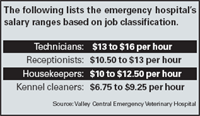Union strikes at management
Whitehall, Pa. — Organized labor infiltrated private practice for the first time at a Pennsylvania emergency veterinary hospital.
WHITEHALL, PA. — Organized labor infiltrated private practice for the first time at a Pennsylvania emergency veterinary hospital.

The bargaining table: It took just a few hospital employees to unionize Valley Central Emergency Veterinary Hospital. Practice Manager Bart Ueberroth's door is open as he faced a staff strike, an upcoming administrative hearing and collective bargaining all in the first year.
The employee alliance and its resulting litigation signals a "wake-up call" for veterinarians, says Pennsylvania Veterinary Medical Association President Dr. Tim Ireland.
"All the rules are different now," he says. "I think this is a big deal for the profession because it's so foreign to us. People who are most subject to unionization are the ones who feel like no one is listening."
If veterinarians are naive, it's because disgruntled staff traditionally does not seek outside bargainers for aid in wage and benefits negotiations, experts say.
As a result of bargaining conflicts, Valley Central Emergency Veterinary Hospital faces charges that practice officials unlawfully withdrew from an American Federation of State, County and Municipal Employees Local 488 contract and locked out employees.
Valley Central representatives deny all charges and were scheduled to formally answer the allegations in front of an administrative law judge July 20 in Philadelphia.
If found to have violated the National Labor Relations Act, some employees will be entitled to retroactive pay and hospital officials will be forced to post notice admitting wrongdoing as well as their efforts to remedy the situation.

The following lists the emergency hospitalôs salary ranges based on job classification.
Valley Central attorney David Spitko argues there's nothing to resolve. In an all-night emergency practice, staff is paid more than the local average wage with adequate benefits, he says. What the dispute amounts to is control, stemming from the hiring of manager Bart Ueberroth, who quickly reined in the previously unsupervised practice run by staff who sleep on the job, he adds.
"We believe that the union organizing drive from the beginning was largely pursued by a relatively small number of employees who won the election," Valley Central attorney David Spitko says. "This was not caused by management screwing up but by bullying people pushing the union on other staff. This was more about personality issues than anything else."
Questionable morale
Union talks began more than a year ago amid staff complaints that Lehigh Valley's only emergency practice lacked proper equipment, oversight and client services. With 32 absentee DVM shareholders feeding the practice and seven off-site board members, management was scarce.
Changes made after Ueberroth's arrival escalated the situation, hospital employees say, with cut vacation time, tardy reviews and measly pay raises. In April 2004, they voted via secret ballot to unionize. By January, failed contract negotiations that included requests for a 3-percent overall pay increase prompted a strike, receptionist Jennifer Powell says.
"This all started because there was no connection between the board of directors and us," she says. "They didn't take us seriously. We were out for a week. We all got phone calls saying the strike was over and a contract would be honored, but then the hospital administration said it was unlawfully signed, and that people were forced into it. We stayed out as long as we could afford to and one by one we came back."
Personality conflicts
Whether or not the hospital reacted lawfully to the union situation is a question for the courts.
DVM
Newsmagazine
's interviews with Ueberroth and board members were monitored during conference calls with Spitko due to pending litigation.
Ueberroth denies that he fails to act as a manager by addressing client complaints and staff injuries. Working mostly business hours, Ueberroth says he didn't hear about the union plans until staff filed a petition with the National Labor Relations Board.
"I really honestly believe that this environment was not one where a union was needed," he says. "They basically come in and make sure the employee makes a fair wage. That issue was not present there. The staff simply wanted to take management authority away from me. That was their goal."
Ueberroth admits serious personality conflicts between him and some staff members might have swayed the decision.
"Up until the strike, it was a hostile environment," he says. "The pro-union people were intimidating. It got pretty ugly. Once the strike occurred, it was a good environment. The negativity was removed. When the pro-union people came back, they weren't as strong of a group. They didn't have the clout."
That might change with union supporter Jody Smith's return as veterinary technician. Out of work since January, Smith went back to Valley Central Emergency Veterinary Hospital last month. Attracting the union was not about money; it was about management, she claims.
"We're not greedy people," she says. "We need a good manager. Everyone wants to make this the best hospital possible. Fair working conditions are what we ask for."
No way out
By fair working conditions, Smith and other union supporters demand on-time reviews and raises. Receptionist Powell claims she didn't receive her 90-day scheduled raise for two years. It amounted to 33 cents an hour, she says. They also cut back promised vacation time, she adds.
In the meantime, those who crossed the picket line during the strike now earn up to $5 an hour more, union supporters say. Spitko denies that claim.
Labor law attorney Lance Geren, with Feedman & Lorry PC in Philadelphia, says he's requested all employees' pay information. Yet he argues that's trivial compared to Valley Central's alleged withdrawal from the employee contract. Representing the disgruntled union, Geren claims to have a strong case.
"The labor board rarely issues complaints in cases where they lose," he says. "We believe we have a really strong case. They're not going to win and they're wasting all this money on wild attorneys fees. We would be interested in seeing that money go to the employees."
Conflict frustrations
The decision to fight instead of settle was made recently by board members like Dr. Terry Stanglein, who says he's "disappointed" the situation has gone this far.
While he admits staff members contacted him concerning their grievances prior to unionizing, he leaves day-to-day management issues to Ueberroth.
Stanglein, who runs a two-doctor practice in Northhampton, Pa., says he doesn't worry about unionizing in his hospital because it's a "family-oriented" operation.
"Unfortunately as you get into big businesses like emergency, things change, and that's one of the reasons you have to have someone steering the boat all the time," he says. "The doctors working there do not have supervisory authority. There is no supervisor on staff through the whole night."
While Stanglein admits to lacking oversight, he disagrees with the decision to strike. The patients should have come first, he says.
"It's about ethics," he says. "I don't believe that people working in medical positions should strike. A caring for patients should override.